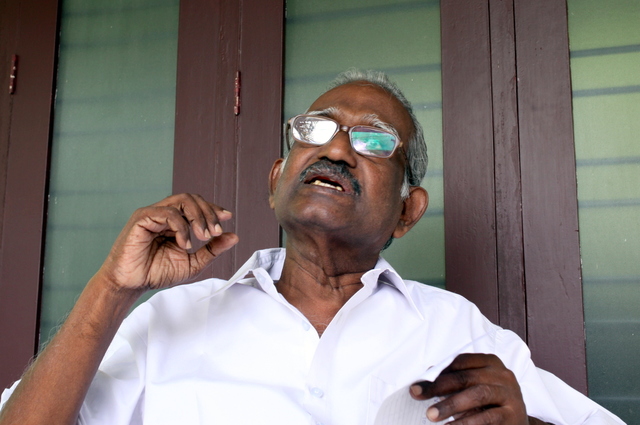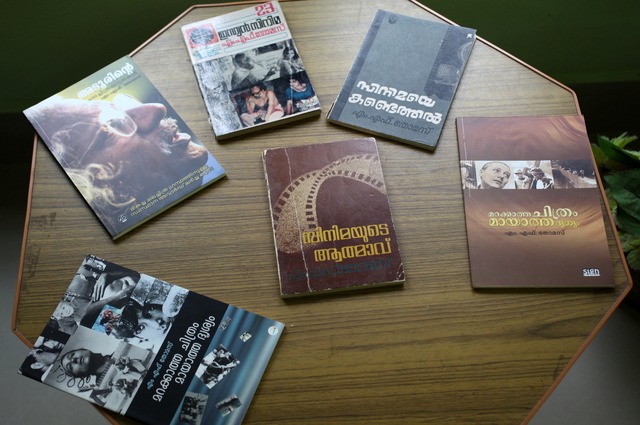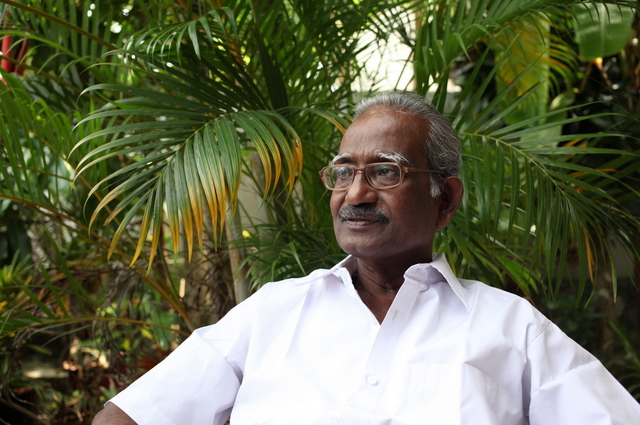27/10/2016
For M.F. Thomas, the defining moment in life came inside a cinema in Thrissur some 50 years back.
As he watched Apu crying near his mother’s grave in the film Aparajito, Thomas too broke down. “That movie wrecked me. May be because I’d lost my mother when I was one-and-a-half-years old. Since then, movies have always stayed with me.”
The long-lasting impact of Satyajit Ray’s masterpiece made Thomas an ardent movie buff, who has since seen close to 5,000 films (4,853 to be precise, he tells me after referring to his diary) over five decades. Ask the 70-year-old about his favorite movies, and he perks up, reeling off scenes after scenes from obscure titles to evergreen classics. Like a master story teller, he takes you to the mesmerizing world of cinema. He will tell you the socio-cultural context of films, how they influenced the aesthetic sensibilities of viewers, and why you should watch them even now. And when he is done talking, you feel like rushing to a theatre and sit in silence to be awed by the magic of cinema.
“There would be few people like him in Kerala with such a vast experience about films,” said R. Biju, Secretary of Banner Film Society in Thiruvananthapuram. “He is always willing to share the knowledge he has acquired over the years, and that has helped us immensely when we were starting Banner.”
Thomas’s stints with film societies began when he moved to Thiruvananthapuram to join the State Institute of Languages in 1969. He took a membership in Chitralekha Film Society, and during one of the film screenings, met Adoor Gopalakrishnan in the society’s office. Adoor, who was yet to make his first film, was deeply involved in the society’s functioning. Thomas remembers a young Adoor handling almost all departments of Chitralekha, including preparing brochures and program notes. The meticulous nature of Adoor was evident in every task he took upon.
“Adoor has not only made great films; he also strived to build a society that appreciates good movies. He also revolutionized other important aspects such as production, distribution and screening of films. He works really hard to bring films to people,” Thomas says.
Their acquaintance from Chitralekha days grew to a friendship that continues till date with Thomas writing a state film award winning book on the master film maker (Adoorinte Chalachithrayathrakal). He has also written the screenplay for a documentary on Adoor, titled `Adoorinte Sargaprapancham.’
Thomas subsequently was actively involved with the Chalachithra and Surya film societies. Straddling between a government job and film societies, he also wrote extensively on cinema in magazines such as Kalakaumudi and Film Magazine in the 1970s and 80s. He went on to become a selection committee member of the International Film Festival of Kerala (he has been associated with IFFK for nearly three decades now), a part of the state and national film award committees and a jury member of Indian Panorama. Thomas has written five books on films, besides several translations and research papers.
“He is not just a film critic, he is a film activist and a man stands to protect good cinema”, says Vijayakrishanan, a well-known film critic and director. “Thomas has done more work for good cinema in our state than filmmakers.”
What’s the relevance of film societies today when you can watch any movies on the Internet?
Thomas says movies are made for large screens in cinemas, and spectators need to enjoy it in the darkness, immersing themselves in the art. “That is the right way to enjoy and appreciate a film; not while you play with your kids and do chores at home. You should watch a movie in your own world.” He also believes that the importance of a film society has only increased when all sorts of content inundate our lives. “The movies screened by a film society are chosen by experts. This ensures you get to watch the best and the most relevant films. Besides, a film society brings together like-minded people, provides for interaction with film makers and also creates a right platform for discussions and studies.”
What are his favorite films? Thomas says the list runs into hundreds. But the top-of-the-mind recalls are Pather Panchali, Jalsaghar (Satyajit Ray); Wild Strawberries, The Seventh Seal (Ingmar Bergman); Ikiru, Rashomon (Akira Kurosawa); La strada (Federico Fellini); Chomana Dudi (B.V. Karanth); Stalker (Andrei Tarkovski); Elipathayam, Anantharm (Adoor).
Among the new films, Thomas is fascinated by Jayaraj’s Ottal, which he counts as the best Malayalam film in recent years (It was Banner Film Society that first screened Ottal). He picks Sanal Kumar Sasidharan, Sajin Babu, Sudevan and K.R. Manoj as promising talents in contemporary Malayalam cinema. “Most of the young filmmakers unfortunately lack a vision about life. The excuse that they are youngsters doesn’t really hold. When Adoor made Swayamvaram, he was also a young man. A film survives the test of time when it has a universal take on life, and when it goes beyond personal boundaries.”



